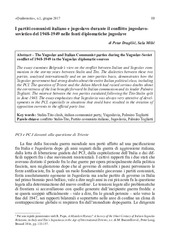| dc.creator | Dragišić, Petar | |
| dc.creator | Mišić, Saša | |
| dc.date.accessioned | 2023-10-06T08:13:55Z | |
| dc.date.available | 2023-10-06T08:13:55Z | |
| dc.date.issued | 2017 | |
| dc.identifier.issn | 0393-6082 | |
| dc.identifier.uri | http://rfpn.fpn.bg.ac.rs/handle/123456789/1032 | |
| dc.description.abstract | The essay examines Belgrade’s view on the conflict between Italian and Yugoslav communism
in the stormy years between Stalin and Tito. The dialectics between these two
parties, analyzed internationally and on an inter-parties basis, demonstrates how the
Yugoslav government had strong doubts about the entire Italian political class, including
the PCI. The question of Trieste and the Julian March had raised serious doubts about
the correctness of the line brought forward by Italian communism and its leader Palmiro
Togliatti. The mistrust between the two parties escalated following the Tito-Stalin split
in June 1948. The essay emphasizes that Yugoslavia was always very attentive of developments
in the PCI, especially in situations that could have resulted in the creation of
opposition currents to the official party line. | sr |
| dc.language.iso | it | sr |
| dc.publisher | Trieste : EUT Edizioni Università di Trieste | sr |
| dc.rights | openAccess | sr |
| dc.rights.uri | https://creativecommons.org/licenses/by/4.0/ | |
| dc.source | Qualestoria - Rivista di storia contemporanea | sr |
| dc.subject | Stalin-Tito clash | sr |
| dc.subject | italian communist party | sr |
| dc.subject | Yugoslavia | sr |
| dc.subject | Palmiro Togliatti | sr |
| dc.title | I partiti comunisti italiano e jugoslavo durante il conflitto jugoslavosovietico del 1948-1949 nelle fonti diplomatiche jugoslave | sr |
| dc.type | article | sr |
| dc.rights.license | BY | sr |
| dc.citation.epage | 100 | |
| dc.citation.issue | 1 | |
| dc.citation.spage | 89 | |
| dc.citation.volume | 45 | |
| dc.identifier.fulltext | http://rfpn.fpn.bg.ac.rs/bitstream/id/2743/fulltext.pdf | |
| dc.identifier.rcub | https://hdl.handle.net/21.15107/rcub_rfpn_1032 | |
| dc.type.version | publishedVersion | sr |

